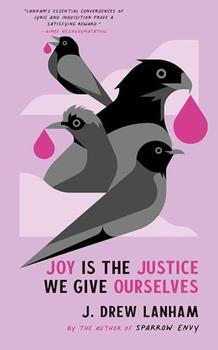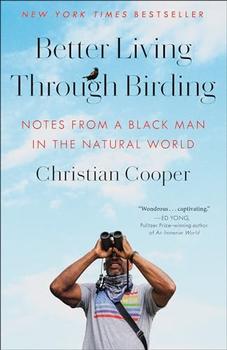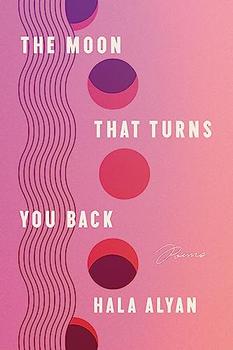Summary | Excerpt | Reviews | Beyond the book | Read-Alikes | Genres & Themes | Author Bio

As a recipient of the MacArthur "Genius" Grant, and a Professor of Wildlife Ecology and Master Teacher at Clemson University, author J. Drew Lanham would be undoubtedly qualified to explore man's relationship with nature in a wide-reaching, academic context if he so wished. Instead, with Joy Is the Justice We Give Ourselves, he opts for a much more intimate and personal approach, exploring the joy and escapism afforded him by spending time surrounded by nature, and the much-needed respite it grants him from the anxieties of existing as a Black man in modern America.
The collection is split loosely into two sections, titled "To Notice" and "To Be Wild." This feels like a subtle nod to the shifting of seasons over time, which is a recurring motif throughout the poems. Even more, it emphasizes the book's core message, which sees Lanham entreat the reader to set aside time to observe the world around them and to actively immerse themselves in natural spaces, away from the bustle of modern life, whenever possible.
With the collection having such a tight thematic focus, some may feel it errs towards the repetitive. This feels deliberate, however. A sense of comfort is brought about by the rhythms, cycles, and reliability of nature, giving order to the chaos of our lives. This idea is taken further with Lanham's subtle yet effective use of alliteration, peppered throughout the pieces. The soft, lilting quality of the language feels like the flow of the natural world. Take the repeating "sh" sound in these lines about the tide from the title poem, suggesting both the sound water makes as it laps against the shoreline and the comforting hush of a parent to a child in times of distress.
Joy is the sunrise
breaking through night's remains,
bright shone new
on a shell-wracked shore;
a fresh tide-scrubbed world
Lanham creates a sense of awe and wonder for moments of simple beauty experienced in nature, as in the piece "Sunflowers, as if":
As if –
to outshine the very sun
that birthed them; as if to out yellow
whatever yellow thought it could be;
as if to glow beyond the waning day;
as if to become irresistible to the birds
who sing as if dismayed in the sudden appearance
of so much beauty
If one thing stands out above all else, it is Lanham's adoration of birds. As he puts it himself in the book's introduction: "Nature is my Goddess and birds, the heavenly hosts." In the freedom of their flight and the beauty of their persistent song, thematic parallels of perseverance and remaining positive are clear. In tandem with its commentary on the Black experience, the collection evokes parallels to Maya Angelou's I Know Why the Caged Bird Sings. It is therefore no surprise when Lanham references Angelou directly in the title poem:
Joy is the justice
we give ourselves.
It is Maya's caged bird
sung free past the prison bars
On this front, Lanham still allows himself to express anger and frustration, despite his desire to purposefully seek joy. Take this excerpt, again from the title poem:
Joy is the flashing blue light
passing by,
not meant for me.
Joy is the good news,
without new dead names,
no chokeholds or murdering knees.
A night of sleep
In your very own bed
without shots in the dark
— no more not waking up,
full of lead.
The directness of his words in these moments, and references to the very real and tragic deaths of Black Americans from police brutality, hit like a punch to the gut. This juxtaposition with the otherwise gentle imagery serves to further emphasize how radical it is for Black people and other oppressed groups to choose joy against all the odds; to be reminded that the world can be a beautiful and healing place, for all the ugliness and hurt it contains.
![]() This review
first ran in the May 1, 2024
issue of BookBrowse Recommends.
This review
first ran in the May 1, 2024
issue of BookBrowse Recommends.

If you liked Joy Is the Justice We Give Ourselves, try these:

by Christian Cooper
Published 2024
Central Park birder Christian Cooper takes us beyond the viral video that shocked a nation and into a world of avian adventures, global excursions, and the unexpected lessons you can learn from a life spent looking up.

by Hala Alyan
Published 2024
From the author of The Arsonists' City and The Twenty-Ninth Year, a new collection of poetry that traces the fragmentation of memory, archive, and family–past, present, future–in the face of displacement and war.
There are two kinds of light - the glow that illuminates, and the glare that obscures.
Click Here to find out who said this, as well as discovering other famous literary quotes!
Your guide toexceptional books
BookBrowse seeks out and recommends the best in contemporary fiction and nonfiction—books that not only engage and entertain but also deepen our understanding of ourselves and the world around us.